Are You Compatible? INFJs and Relationships
I’ve been putting off writing about the INFJ and compatibility in relationships for a while. Maybe it’s because I felt like it would be a little conceited to talk about how awesome INFJs are in relationships when I am one. Maybe it’s because pretty much every book out there says that INFJs do best with other intuitive types, and I’m married to a sensor. I guess that’s just the kind of rule-breaker I am!
Seriously though, I think a lot of it has to do with the fact that, as I’ve said before, I’m NOT a relationship expert and so I believe that (often) people take the MBTI® too seriously in their relationships. There have been those who question their relationships after finding a chart somewhere that says their type and their partner’s type are incompatible.
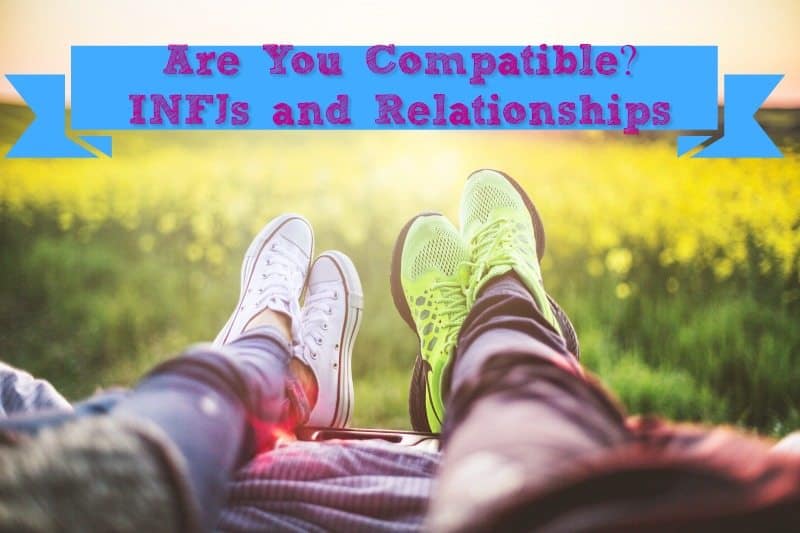
The MBTI® can tell us where potential strengths and weaknesses lie, but it does not say ‘avoid this type / be with that type’. There are pluses and minuses to any relationship, and people within a type can vary so much based on upbringing and environment. Yes, intuitives and intuitives tend to inherently understand each other’s perceptions better, as do sensors and sensors. However, you really can have a happy relationship with any type as long as you both do your best to be understanding and to work on balancing out your strengths and weaknesses.
Not sure what your personality type is? Take our new personality questionnaire here. Or you can take the official MBTI® here.
If you want more in-depth info on INFJs and relationships be sure to check out my eBook The INFJ – Understanding the Mystic
What INFJs Want In Relationships
Is the perfect soulmate too much to ask for? Really? One of the struggles of being an INFJ is that of being a true idealist and a perfectionist. While we are very warm, affirming people by nature – we also tend to be over-achievers in relationships. We want to be the “perfect” partner, and we tend to want our partner to be the “perfect” soulmate. We want someone who will make the effort to truly know us (which can take a while as we’re very private), and someone who will listen to our greatest hopes and dreams and ambitions. An INFJ would passionately cling to a life of singleness over being married to someone, or dating someone, who they feel little passion or depth of feeling for. INFJs are very independent, and while we long for a partner and soulmate in life, we have very little tendency to be desperate or to “settle” for anything less than someone with whom we share a very deep connection.
As David Kiersey so aptly puts it; “Finding that rare person with whom they can share their inner world is difficult for idealists, a painful process of trial and error, and often they vow not to date at all for periods of time rather than go through the search. For NFs, dating someone means more than physical fun or social experience; it is an opening of their heart and mind to the other person, in some cases a baring of their soul, and carries with it both a promise and an expectation of deep regard and mutual understanding.”
In relationships, INFJs usually seek intelligence (both intellectual and emotional), authenticity, and openness. Ideally, since we are always on a quest for personal growth, we want a partner who is seeking this same kind of personal or spiritual growth. We want to see the dark and light side of a person, not just the side you choose to show us. We’re pretty good at detecting phoniness or hidden agendas, so being honest and open is one of the best ways to impress us.
 What INFJs are Like in Relationships
What INFJs are Like in Relationships
I may have painted us to be quite a demanding group of people, and maybe you’re thinking “wow! these people sound high-maintenance!”, but let me add a point. INFJs are extremely loyal and understanding. Once we’ve made the decision to commit to a relationship with you, we will love you unreservedly and passionately – seeing the best that’s in you and overlooking a multitude of weaknesses. We have plenty of our own weaknesses, of which many of us are highly aware. Personal weaknesses are easily overlooked, but if you degrade or criticize one of our deeply held values it’s not likely to go so well.
As perfectionists, we INFJs work hard at our relationships to try to be the best we can be for our partner. We aren’t perfect, that’s true, but we certainly do try to be. We hold ourselves to a higher standard than we generally hold our mates and children; so while we may at times seem too idealistic, we are usually going to be extremely thoughtful and caring towards those we love. We are also (usually) very empathetic and good listeners, and we will do what we can to make sure harmony is maintained in the relationship.
INFJs are often very sincere romantics. We love to express our feelings through gifts; usually gifts with a symbolic meaning, like a beloved piece of music, a favorite book, a piece of artwork. We may write poetry, love letters, or find other ways to show you how deeply we really care. When in love, we often make ourselves more vulnerable than is naturally comfortable for us. This, for us, is a way of being generous and authentic with our partners. It may scare us to tell you that we love you, to write you that poem, or to have you listen to that song that describes how we feel. But showing you, or giving you, these long-locked pieces of our hearts, are one of the most generous ways that we as INFJs can show our love.
Keep in mind, INFJs usually are better at expressing their feelings through writing, than through speech. Many INFJs harbor deeper feelings than they say out loud. A great way of unlocking those feelings is by engaging in letter-writing (not just texting!). In letters or even emails, you will often see a side of the INFJ that they have a harder time showing in person.
So what should you do to make your INFJ happy?
– Be 100% yourself.
– Don’t be scared to think outside the box.
– Listen to our passions and our deep feelings.
– Talk about your passions and/or feelings.
– Have a hard time talking about feelings? Write them down! We love written communication.
– Be kind. We tend to be on the sensitive side.
On a side note, I have officially come to the conclusion that writing about what INFJs want in relationships as an INFJ is awkward. I feel like I’m pointing out all our strengths and ignoring our weaknesses…don’t worry, we’ll get to that!
What NOT to do:
– Be passive-aggressive. INFJs do not handle this well and tend to give up on relationships where they’re faced with this regularly.
– Dismiss our theories or insights. Ni is an INFJs most advanced function. While we’re not always right about our insights, we are more than most.
– Criticize our sensitivity. INFJs are often highly-sensitive people, and things like loud noises, bright lights, and lots of commotion can make us extremely overstimulated. We can also get very overwhelmed and frightened by horror movies (although we may still like them).
– Criticize our intense emotions. INFJs are not good at internally managing their feelings; their unique combination of Ni (introverted intuition) and Fe (extraverted feeling) makes it very hard for them to sort out what’s going on when they experience emotions. Because of this, they often feel overwhelmed by emotions and feelings they don’t even understand. It can become so intense that they become physically sick as a result. Because their feeling function is extraverted, they will easily understand other people’s feelings, but be unable to decipher their own. If they externalize (talk about) their feelings, they are then able to process them through extraverted feeling. So being able to listen, give your input, and not judge is an essential part of being in a healthy relationship with an INFJ.
INFJs and Guardians (SJ types) in Relationships:
INFJs and SJ types usually enjoy very comfortable and happy relationships. INFJs appreciate the stability and responsible nature of the SJ types. The SJs appreciate the warmth, passion, and sincerity of the INFJ. Guardians (SJ types) can feel like a stable force in the INFJs life since INFJs are prone to feeling scattered and of two minds about many things. In turn, the INFJ can add some creativity and intensity to the relationship that the guardian admires and appreciates. These two types will both take the relationship seriously and be very committed to each other. An INFJ usually (not always) will get along better with an ISFJ/ESFJ type than an ESTJ/ISTJ type, simply because both are concerned very much with maintaining harmony and will work to take care of each other’s feelings. ISFJs and ESFJs have Fe and Ti, which INFJs also have. INFJs share no common functions with ISTJs or ESTJs.
However, the MBTI shouldn’t always be a guideline for relationships and many STJs and INFJs have very happy relationships.
Problems arise for INFJs and SJs in relationships often due to the N/S difference. The SJ may tire of the INFJs flights of passion and imagination; and they may see the INFJ as being impractical, with their head in the clouds. The INFJ, in turn, can view the SJ as being “boring”, lacking vision, or being overly traditional. INFJs with thinking SJ types can feel that they are too bossy, or too insensitive to others’ feelings. If they aren’t careful, INFJs and SJ types can work at changing each other too much, to the effect that they both feel unappreciated and let down. It is extremely important to balance out your functions and appreciate the other’s strengths. INFJs would do well to appreciate the SJ partner’s introverted sensing. Admire that they have such an incredible memory and such an eye for details. Learn about their functions and give them the appreciation they deserve. SJ types should appreciate the INFJs vivid insights, and genuine warmth, and generosity.
INFJs and Artisan (SP Types) in Relationships:
INFJs and SP types can have a lot of fun and excitement in their relationships. INFJs appreciate the SPs fun-loving, spontaneous nature. SP types usually have a strong physical presence and are full of action and energy, due to strong extraverted sensing. The INFJ can really appreciate this since their Se is inferior, and their partner can help them to strengthen their Se. In turn, SP types are often impressed by the INFJs strong use of intuition, an area where they are naturally weaker. INFJs love the playfulness, live-in-the-moment, laid-back style of the SPs. In turn, the SP types are inspired by the INFJs depth, passion, and insights. This often is an “opposites attract” type of relationship, where both partners admire the other’s strengths since it is usually an area of their own personal weakness. Someone with weak Se may admire someone with strong Se. Someone with weak Ni might admire someone with strong Ni, etc,..
Usually, the major problems with the SP/INFJ relationships have to do with the N/S difference. SP types often have little interest in talking about their “inner lives”, and would rather be doing something other than talking. While INFJs are abstract and theoretical, SPs are extremely concrete and practical. SPs, more than any other type, live completely in the moment. INFJs live with their thoughts always on the future. INFJs live in their heads, SPs live fully in their bodies – taking in every sensation and being very aware of external stimuli. For this reason, the SP can often see the INFJ as having their head in the clouds or being flighty and unrealistic. The INFJ, in turn, can see the SP type as not thinking deeply enough, or being too focused on the here-and-now without regard to the big picture.
I myself am married to an ESTP so I can tell you from experience that the SP/INFJ relationship can work really well. He is really laid back like SPs tend to be, and that helps me to be calmer and to take things more one day at a time. He is also an optimist (most SP types are) and I’m more of a pessimist, so he keeps me really balanced in that respect. He appreciates my insights and trusts them, and even though he’s a sensor we’ve been able to have some really in-depth discussions about abstract concepts. Being with him has definitely helped me to balance out my Ti and Se functions, and he’s developed more of his Ni and Fe. When we got married, I remember seeing all these charts that said the INFJ/ESTP relationship was a REALLY bad idea. While we’ve only been married for 3 years, I think I can say with relative certainty that we shouldn’t put all our faith into charts, or even compatibility articles or posts like this one! Each pairing is going to have its own unique pros and cons regardless of MBTI® type, and the key is to be understanding of each other and appreciate each other’s strengths, even if they’re very different from your own.
INFJs and Idealists (NF Types) in Relationships:
INFJs do exceptionally well with other idealists. While many types struggle with relationships within their own temperament, INFJs often find that true soulmate with another NF type. Two NF types together can find deep satisfaction because they are finally able to be with someone who truly understands them, which is usually such an elusive thing for an INFJ to find. They will enjoy sharing their inner worlds with each other and will take very good care of each other’s emotional needs. They usually have very intense, romantic, intimate relationships that may feel “too good to be true” many times.
Unfortunately, no relationship is without its struggles – and this definitely applies to the INFJ/NF relationship. An INFJ and another NF type can be so concerned with each other’s feelings that they risk invading each other’s personal space. INFJs are extremely independent and private, and so after a while, they can feel a need to get away and have some of their space back. They can have the same effect on the other NF type in the relationship. The other problem area is that they are both bound to be so intensely passionate about their visions and goals that they run the risk of tiring each other out. INFJs and other NFs are also not known for being particularly good with money and practical affairs, which can end up causing difficulties throughout their relationship.
Sometimes the differences that partners have can provide a balancing/relieving effect to each other. For example, a feeler is getting carried away with their emotions, and a thinker helps them to see things in a more rational way. A thinker is being too tactless in their relationships, so a feeler helps them to find ways to re-word things. Two types in a relationship who share the same temperament may end up “living in a bubble” and become too focused on a narrow perspective of life and how things should be done.
INFJs and Rationals (NT Types) in Relationships:
The INFJ/Rational match is considered by many MBTI experts to be the best pairing. In the rational partner, the INFJ can find someone who, like them, thinks in abstract terms, who sees the world of possibilities, ideas, and theoretical concepts. Yet, unlike another NF, the NT has a certain autonomy and calmness that the NF finds to be intriguing and relieving since INFJs can get so overwhelmed with their own soul-searching and intense emotions. The NT type will likely see in the INFJ a warmth, passion, and sincerity that they admire and desire. Conversely, for the NF type, they see the NT type as being intelligent, intellectually stimulating, and brimming with ideas that are inspirational and fascinating. These two types together can engage each other’s intuition and ideas and can be an unstoppable force for innovation and brilliance. David Kiersey says that the best match for the INFJ out of all 16 types is the ENTP. He says:
“The reserved and schedule-minded Counselors (INFJs), with their complex, mysterious, symbolic inner-worlds, tend to become trapped by introspection and tied in ethical knots, and they can be freed up considerably by the outgoing and probing Inventors (ENTPs). Counselors might also find great satisfaction in trying to help the non-conformist, sometimes even reckless Inventors find their soul and significance in the scheme of things.”
Of course, there are always potential problem areas for any pairing. With this duo, the problems mainly lie in the T/F difference. The INFJs firm belief in their intuition may exasperate the ever logical NT types. The INFJ may also feel that the NT type lacks sensitivity or depth of concern for humanitarian issues. The NT type may find the INFJ overly absorbed in their feelings or in other people’s feelings and may wish for more of a calm, steady partner at times. However, if both types work to stay balanced and healthy and try their best to understand each other, this pairing can be incredibly successful.
INFJ Strengths in Relationships:
– Good listeners
– Warm and empathetic
– Sincere and authentic
– Open-minded and imaginative
– Protective of their partner’s feelings
– Have very high expectations of themselves (both a strength and a weakness)
– Take their commitments seriously
– Excellent communication skills, particularly in writing.
INFJ Weaknesses in Relationships:
– Very private. They can keep part of themselves hidden.
– Detest conflict or criticism
– Not usually good with practical day-to-day matters or finances
– Can hold their partners and themselves to an unrealistic standard
– Can have a very hard time leaving a bad relationship
What are your thoughts?
Are you an INFJ with some insights into relationships and MBTI compatibility? Are you a different type with any thoughts? Let me know what you think in the comments! I’d love to hear from you.
Find out more about your personality type in our eBook, Discovering You: Unlocking the Power of Personality Type.
Sources:
I wouldn’t be able to get very far without the help of these AMAZING books and web pages. If you want to know more about the INFJ, the other MBTI® types, or relationships, check out the sources for this post.
Please Understand Me II by David Kiersey
Just Your Type – Create the Relationship You’ve Always Wanted Using the Secrets of Personality Type by Paul D. Tieger
Personality Page – INFJ Relationships
Personality Junkie – INFJ Relationships (AWESOME web site!)
Get Your Free INFJ eBook
As a thank you for subscribing to my newsletter I will send you this free eBook PACKED with self-care tips, creativity hacks, and more! You'll also get a 3-day email course for understanding your personality type better!


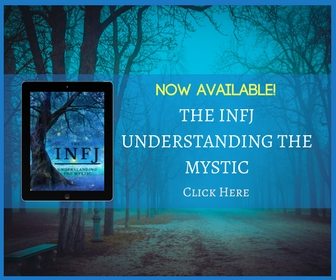
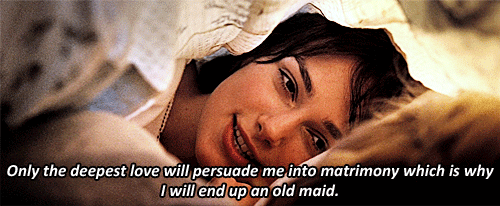
 What INFJs are Like in Relationships
What INFJs are Like in Relationships




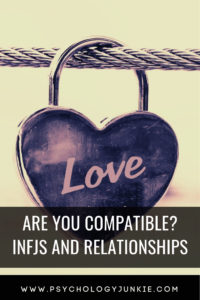
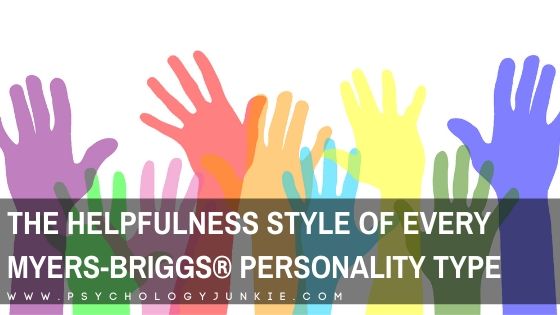
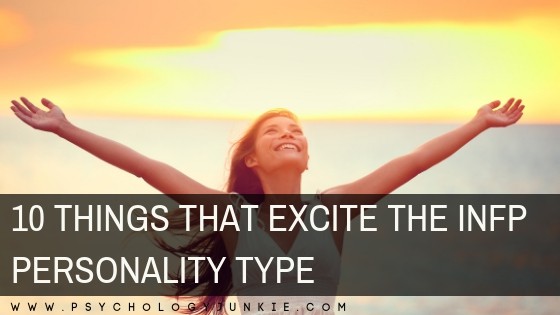


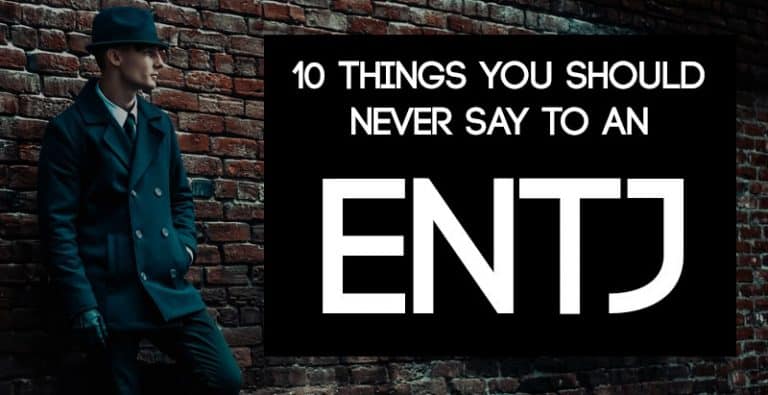
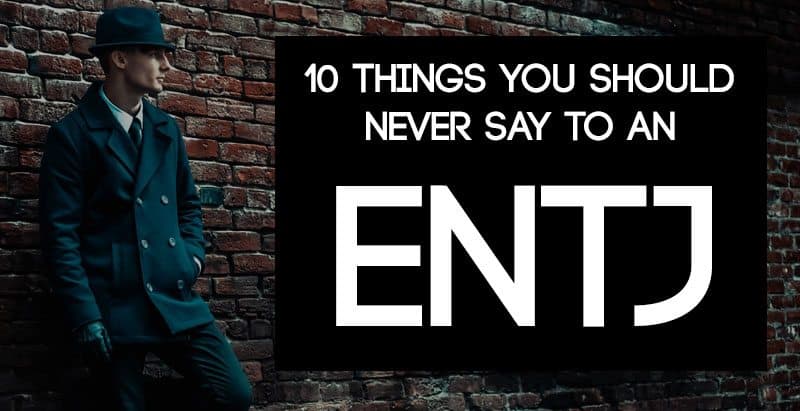

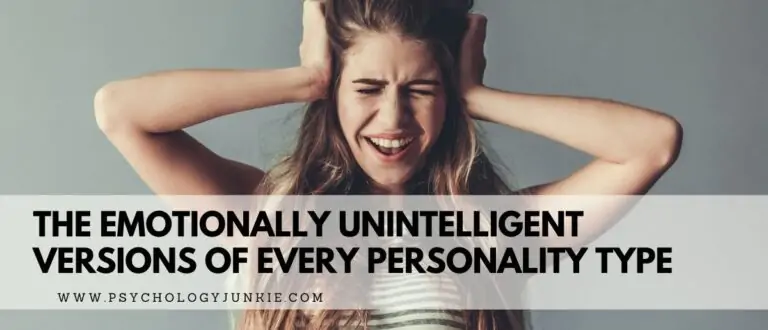
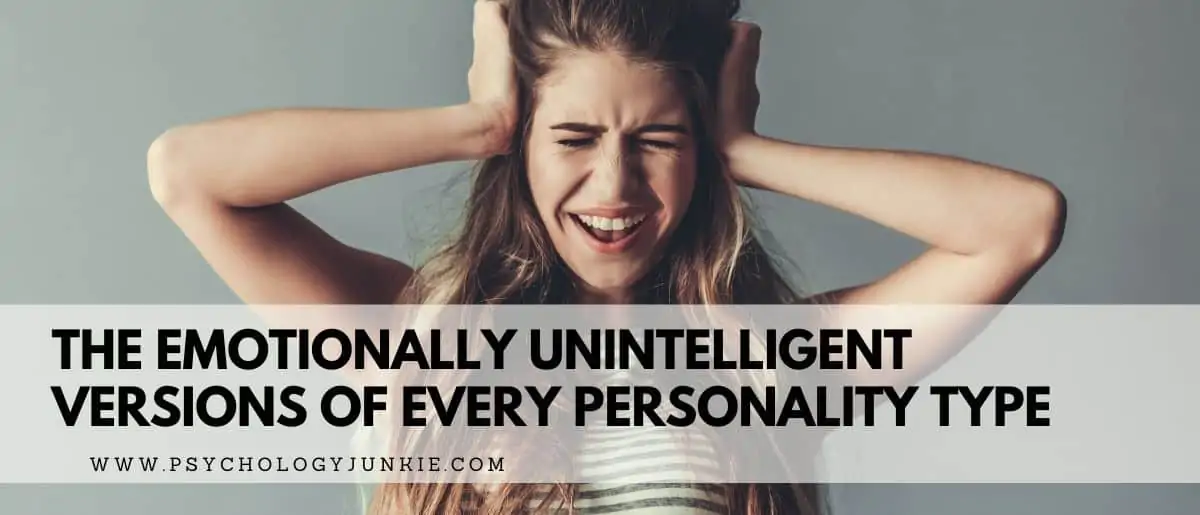
Love this post! I am an INFJ and my boyfriend is an INTP. I find that we are both sensitive people and can connect on a very deep level. But his thinking nature helps me to balance my feeling nature, which can get extremely overwhelming! As an introvert I find the dating process to be extremely nerve-wracking, so I’m glad we are at the part of our relationship where we know and trust each other well.
I enjoyed this post so much! Haven’t been in a serious romantic relationship yet, but I’ve found what you’ve written to be true in the types of people I find myself attracted to and who I’ve formed friendships with.
The more I read about MBTI types and relationships, the more I’ve tried to get away from the idea of searching for someone who is my “ideal/perfect” type. I’m more focused on shared faith and good communication now — if we have a similar worldview and belief system, and I feel safe talking with them, then it doesn’t matter so much what their personality type is. I’ll admit I still have some “favorite types,” but I’m trying to not let that influence me so much.
Never understood why so many people think INFJs and ISTPs aren’t compatible — we share all the same functions, just in a different order. Nice to hear from someone that the relationship can work out 🙂 I think Isabel Meyer was an intuitive happily married to a sensor (INFP and ISTJ if I remember correctly), so even the woman who created MBTI and said Intuitives are most compatible with other Intuitives found that wasn’t the case in her marriage.
Hi Marissa! Thanks so much for the encouragement. I really appreciate it! I always feel so under-qualified to give out ANY kind of relationship advice that I feel a little sheepish posting these kinds of things. That’s why I gather so much from books and other sources, and try to put my own spin on it.
I definitely feel that people use the MBTI to a fault sometimes when it comes to relationships, and they start becoming unsatisfied in their marriages or relationships because that person isn’t “compatible” based on some chart or on something they read in a book. Like you, I think faith and similar goals and worldviews are extremely important. Way more important than being a sensor or an intuitive, an introvert or an extrovert. I basically use the MBTI to try to UNDERSTAND people better, not to try to find reasons to create barriers or anything like that. Of course we have the people who just get us better or conversation flows more smoothly with. Overall, I do believe that God is in charge of who we’ll marry or end up with…speaking of which, I hope when you do get into a serious relationship, that person is AMAZING 🙂
Thanks again for the comment! It’s so fun to talk about this with other people who know so much about the subject 🙂
Thanks for the comment! I think INTPs and INFJs are an awesome match 🙂 Have you ever heard of the book ‘Just My Type’ by … can’t remember the name now, sorry (and if I wasn’t in bed I’d go find it!) Anyway, it goes through each type and how well they are compatible with each other type. If you’re interested I can look up the section on INFJ/INTP and send it to you or something. It’s a pretty helpful book. It sounds like you guys have a really good relationship, though, so you probably don’t even need it! I HATED the dating scene….so glad I’m out of that now. Modern dating is crazy…
That sounds like an a awesome book, I would love to read that section! And it really is, it’s quite an overwhelming scene!
Hey Susan!
Another INFJ here. Im very keen on the topic and I have to say that your post is awesome: you made it both complete and very clear for people to understand it and rise interest about personality types. I just discovered mbtijunkie and Im really looking forward reading more from you.
In exchange I will leave you here two of my favourite books about the topic. If you didnt read them still, give it a chance 😉
http://www.amazon.com/Not-Crazy-Just-You-Personality/dp/185788552X/ref=sr_1_1?ie=UTF8&qid=1445892557&sr=8-1&keywords=im+not+crazy+im+just+not+you
http://www.amazon.com/Gifts-Differing-Understanding-Personality-Type/dp/089106074X/ref=sr_1_1?s=books&ie=UTF8&qid=1445892887&sr=1-1&keywords=gifts+differing
Regards!
Thank you!! I love the Gifts Differing book, and the other one I haven’t read, so I will have to check that out! I appreciate your feedback and encouragement. Its always nice to know I’m not completely off base 🙂
Per usual (which means very good in INTJ) you have once again landed spot on. Living with an INFJ/P (she is of two minds) is at times a challenge. I often find her level of commitment overwhelming since it is based mostly on intuition versus logic. However she is often thoughtful and protective making for warmth. I think this was a great piece for you to do since you have first hand insight. Plus your guidance always comes with the recommendation to grow. Which is always advisable! Great work and writing.
Per usual (which means very good in INTJ) you have once again landed spot on. Living with an INFJ/P (she is of two minds) is at times a challenge. I often find her level of commitment overwhelming since it is based mostly on intuition versus logic. However she is often thoughtful and protective making for warmth. I think this was a great piece for you to do since you have first hand insight. Plus your guidance always comes with the recommendation to grow. Which is always advisable! Great work and writing.
Thank you! I am glad you are enjoying some of the benefits of a relationship with an INFJ! I know we can be kind of crazy sometimes:) I do think the INTJ/INFJ pairing can be really good! My sister-in-law is an INTJ and we have GREAT conversations 🙂 Thanks again for the encouragement! I always appreciate it.
So funny. I am an INFJ married nearly 30 years to an ISTP WHO DRIVES ME COMPLETELY BATTY sometimes. Thankfully his S is borderline N so we do actually share some of that, but your article hits home in many ways. We make each other grow, to say the least.
There seem to be a lot of INFJs married to ISTPs! There must be something about the two that attracts each other 🙂 We are definitely very different and I think we can drive each other very crazy (my husband wants me to relax and go with the flow more, and I want to have deeper, more theoretical discussions more often). We still have a lot of fun though, and I admire what makes him different. I know there are some days we both make each other a little crazy though! Thanks for commenting! Very fun to hear from another INFJ in an ISTP relationship!
Enjoyed this post, thanks. My husband of almost 20 years is ISTP and I’m INFJ. We also have a great relationship 🙂
Thank you! I’m so glad you enjoyed it!! The INFJ/ISTP relationship seems to be really common! There must be something really special between these two when they’re together 🙂
I just found out I’m a INFJ today and it was such an eye opener. I’ve always felt conflicted, generally very emotionally overloaded and confused as to what I was really feeling . I also found I had a very unrealistic view that every one experienced and expressed love in the same capacity as myself . My sons father and I have been having relationship problems since we found out I was pregnant and moved in together . We also just found he is ISTP today . For the last two years I truly believed I was living with an emotionless , shallow , ignorant , adrenaline junkie , Jerk face to put it nicely . This completely clashed with all the good qualities he constantly displayed to me . I couldn’t figure out how this man could tell me he loved me but show so little interest in having a deep connecting conversation with me and be so dismissive of my emotional turmoil. We would get along fine for weeks and inevitably he would do something that was inconsiderate of my feelings . This would cause a huge fight , where he would shut down and I would go on uselessly about how you were supposed to treat people you loved based on my ideals . After learning our personality types , I now have a greater understanding of my guy and myself . Every fight we have had as been a HUGE misunderstanding of how the other thinks and reacts to different situations . Everything I read up to this article has made it seem that INFJ / ISTP cant get along or work things out . Your article has given me hope that we can take these personality profiles and learn how to work together to ensure both our need are met to a satisfying level on both sides . I am very happy at being disillusioned with my views of love , as it means that neither of us are wrong we just view things differently . His love is no less then mine because he expresses it differently than I expect . Thank you for sharing this , and giving me hope . If we don’t work out we can still part on good terms knowing we tried everything and in the end it was our differences not our faults that divided us . I’ll feel completely satisfied and at peace now no matter the out come
Thank you so much for commenting on this! I really do think there must be something special between INFJs and ISTPs because out of all the relationship pairings I hear from the most, this is by far the most common! I think it’s safe to say it may be because we share the same functions, just in a different order. There’s a sense of ‘getting’ each other, but yet…not quite. It’s like we’re opposites, but there’s something there – a similar tie. If you think about it, in your 30’s you develop your tertiary function, which for an INFJ is Ti (Introverted Thinking). IN his 30’s he’ll be developing Ni (Introverted Intuition). Ti is his dominant function and Ni is your dominant function. I feel that a lot of ISTP/INFJ relationships tend to blossom more in middle age because of this – it’s just a theory of course, but it would make sense to me. Also, Ti is your relief function, while Ni is his relief function – so there’s something kind of balancing about being together in a relationship. Yet it can still be rough because we are very different types! I am so glad you feel at peace and happy in your relationship now. INFJs and ISTPs do show love very, very differently – but they are each incredibly special, wonderful types. My ISTP husband is incredibly loving, but sometimes I’ll think ‘wow, that was thoughtless’ but then I realize it wasn’t – it just wasn’t the way I would have done things. I’ve realized my way isn’t the right way, it’s just different. Some times of course, his way or my way is right depending on the situation. Anyway, I’m really glad this helped and I wish you the best of luck in your relationship – I do hope it goes well!!